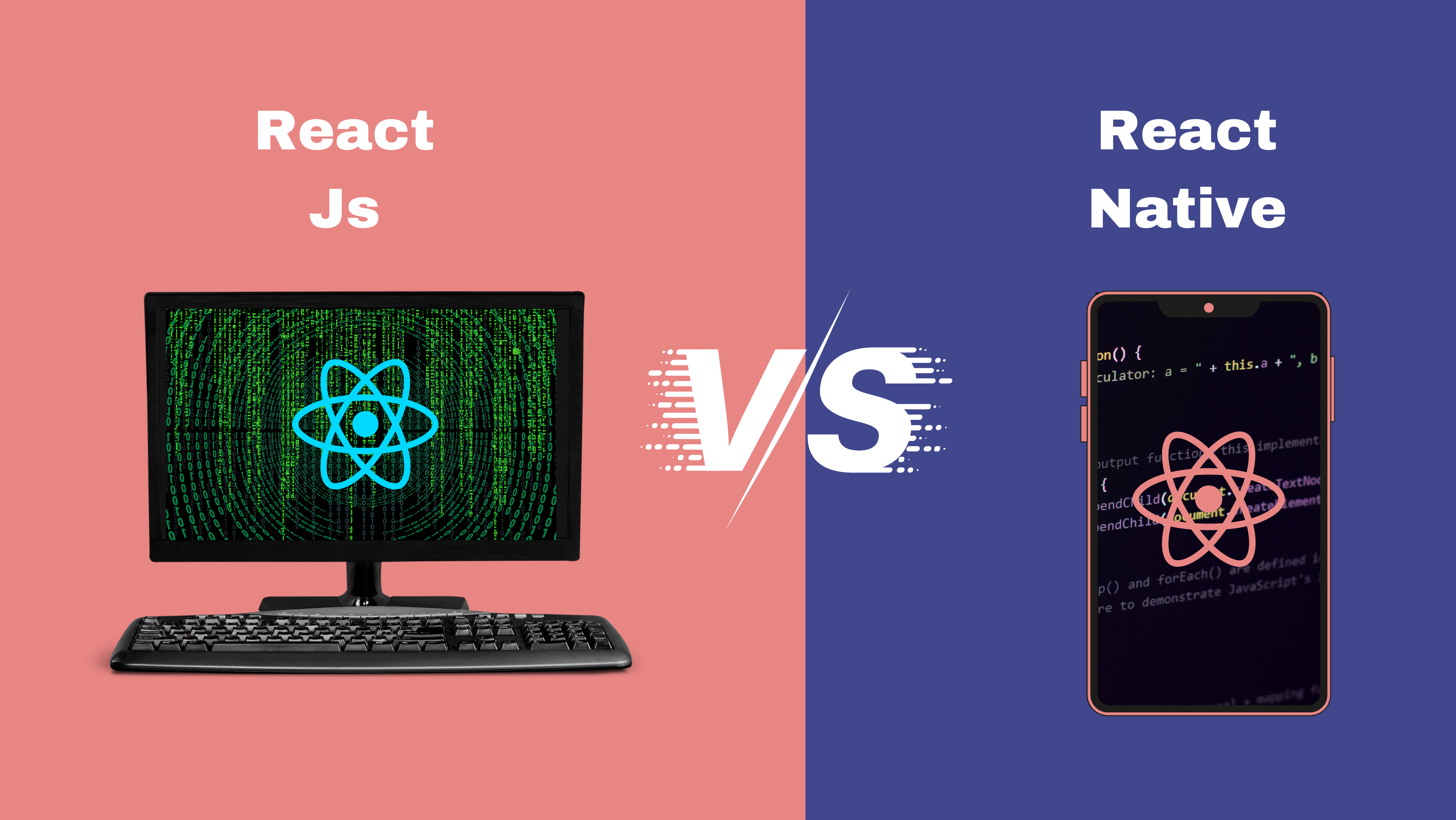The Difference Between React Native And React | Javascript works
Fawzan Hussain
30 Mar 2022
•
6 min read
Have you ever faced confusion between Reactjs and React Native, and which one would be better suited to accomplish your ideas? Or the similarity in their nomenclature has made you question the difference between them? Can they be used interchangeably? To find an answer to all these questions, let us take a quick look at the histories of these technologies, how they came into existence, and what purposes they solve for programmers across the world.
Today Reactjs and React Native are at the core of numerous websites and apps that are widely popular and have grown into mammoth enterprises. One such enterprise is Facebook (now Meta) itself. The year was 2011 when Jordan Walke, an engineer at Facebook, created the prototype of what we know as Reactjs today. It was first deployed in the Facebook news feed and then on Instagram. The need to develop new technology for the Facebook app came because of decreasing efficiency caused by constant updates.
On the grounds of these developments, the inception of React Native took place. After months of constant tinkering and development, the first version of this open-source UI framework was released. Hence, both these technologies are developed and controlled by Facebook.
For starters, we know that Reactjs is a Javascript library, and React Native is a framework used to build applications using Javascript.
Reactjs And Its Advantages In Business
As a javascript library, Reactjs supports both front-end and server-side development and can even make user-interface for mobile applications and websites.
Key Advantages
Brings Superfast Speeds
Reactjs brings superfast speeds to developed applications and websites using the Document Object Model (DOM). A data structure cache is created by React; this in-memory cache computes the resulting differences and then smoothly and swiftly updates the browser’s displayed DOM. The code written by the programmer is that the whole page gets rendered based on each change, but in actual functioning, only those components that are subject to change undergo rendering. This gives an added edge of speed to React, which is instrumental to developing any type of application.
Is Great for SEO
As mentioned above, Reactjs is capable of server-side development, and this backend capability brings an edge to the Search Engine Optimization of the web pages. To index and cache the content of a webpage, a search engine bot has to visit the server. When all the content and visual assets, such as images or videos, are already rendered on the server, it becomes easier for the bot to do its task of indexing and further make the ranking process faster. Hence, Reactjs gives an added advantage to businesses and websites due to its enhanced SEO process.
Direct rendering from the server also reduces page load time, which enhances the user experience to several notches.
It Is time-efficient due to Component-Based architecture
One thing that helped React create such a great impact in the industry was its concept of reusing components. Through this component-based architecture, unit pieces of an extensively large user interface are turned into micro-systems that are not dependent on the bigger system.
Think of an application with a large UI, like Paypal or Facebook, to understand better. Whenever any component within a certain section of the interface needs to be redefined, it can be accomplished without interfering with the whole interface of the app.
Has a huge community of developers
Reactjs has a massive and dedicated community of developers who keep adding to the already extensive ecosystem of component libraries, extensions for code editors, tools, IDEs, etc. When such a wide range of tools and third-party extensions are available, the scope for innovative problem solving and development increases manifolds. These facilities are rich from a development point of view and save a lot of time when working with common components and extensions.
Advantages of React Native
React Native is a cross-platform framework that uses Javascript to build native applications. It compiles native app components and enables the programmer to build mobile applications in Javascript that can run on various platforms like Android and IOS.
Front-End developers have it easy.
Javascript is the core language for most of the code in the React Native framework. So, if someone is a front-end developer, it becomes way easier for them to get a good hold over React Native and create apps independently. For developers with a good grasp of Javascript, all they require to create native apps in React Native are platform APIs, UI elements, and some design patterns specific to the platform they are building for. It will be ignored if we do not consider React Native a game-changer in app development, as even non-programmers can give shape to their ideas without huge efforts. This technology brings a whole new level of creative power to the hands of the ideator, who also happens only to work front-end development.
Is agile and adaptive
The component-based structure of React Native lets the developer build apps in a more agile process than a majority of the hybrid frameworks, which happens without any web.
Has Platform-Specific Code
React Native lets you (the developer) generate platform-specific code for your app or website, and it is one of the most valuable propositions of this framework. This is an automatic detection process where the framework itself catches the platform it runs and generates the code for the right platform.
The Underlying Differences Between React and React Native
Despite some similarities in both the technologies, Reactjs and React Native has some noteworthy differences:
-
Reactjs can be put across as a base derivative of React DOM for the web platform, while React Native is itself a base derivative. This iterates a similarity in the syntax and workflow, but components are not identical.
-
Virtual Document Object Model renders the browser code in Reactjs, but in React Native, native APIs render components in mobile.
-
React uses HTML in UI to render, but with React Native, a grasp of the React Native syntax is required. JSX is used to render UI in React Native, which is Javascript.
-
React Native doesn’t use CSS to create styling, unlike Reactjs. Stylesheets are used to create styling in React Native. CSS can further be used for animation in Reactjs, but the animated API, which comes with React Native, is used to animate different components of an application.
React is apt for creating high-performing dynamic web interfaces and has a responsive UI to put things in perspective. Whereas, React Native should be your go-to for building mobile apps with a truly native feel.
Limitations
Despite being groundbreaking in their respective capabilities, both Reactjs and React Native have their own sets of drawbacks.
With Reactjs
-
With React, it becomes a necessity often to download different react-enabled libraries. It increases the overhead costs and time consumption.
-
The learning curve with React is steep. The support for external libraries, which is an advantage otherwise, also has complexities that are not very favorable for a new developer.
-
Data navigation in Reactjs is a complicated process as it doesn’t support parallel data handling.
With React Native
-
There is a lack of native libraries in React Native, which slows down the development process in instances where the app has some heavy functionalities. In the case of complicated calculations, Swift, Java, and Objective-C have been seen to be faster than Javascript.
-
The otherwise advantageous aspect of the loosely held framework of React Native can pose challenges at times. There can be a logic clash without any parameters, and it will be challenging to resolve because a variable can be anything under loosely held abstraction layers.
-
React Native requires substantial native workarounds if specific functionality is not found in the framework. This can increase expenses and reduce time efficiency as new native modules will have to be written in such scenarios.
-
There is an issue of licensing with React Native. As Meta oversees the open source licensing and patent of React Native, it brings uncertainty for developers worldwide. According to a new update, if a developer violates the patent or uses the platform for a purpose that Meta doesn’t like, the company can shut the app and stop the developer from using the platform.
Which Is Better- React vs React Native.
Reactjs is a javascript library, and React Native is a framework; the former is an instrumental part of the latter.
And if you have read till here, you must have understood that both these technologies are cornerstones of the web and app development world. It is also quite evident that both of these solve varying degrees of purpose. As a developer, you must choose one after carefully analyzing which one fits your needs and ideas better.
Fawzan Hussain
An SEO consultant and the CEO of Seooptimizekeywords.com. With over a decade of experience in the industry, I'm passionate about helping businesses achieve their online marketing goals through effective SEO strategies.
See other articles by Fawzan
WorksHub
Jobs
Locations
Articles
Ground Floor, Verse Building, 18 Brunswick Place, London, N1 6DZ
108 E 16th Street, New York, NY 10003
Subscribe to our newsletter
Join over 111,000 others and get access to exclusive content, job opportunities and more!




